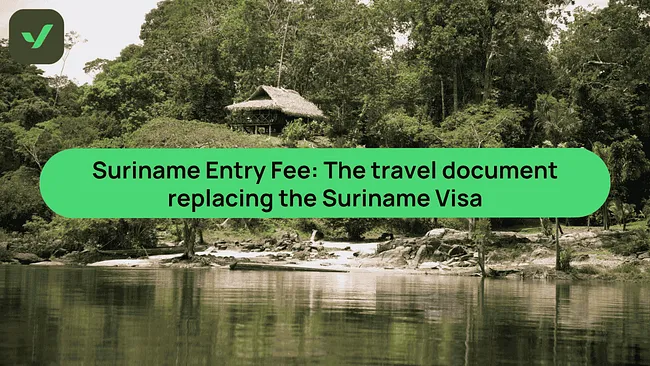
Suriname
Welcome to Suriname
Traveling to Suriname? You may need a visa – find out if you do, which type, and how to apply so you can get the paperwork out of the way and focus on your trip.

What’s a Suriname Entry Fee and who’s it for?
Who’s the Suriname Entry Fee for?
This fee applies to all tourism and business visitors entering via the Johan Adolf Pengel Airport, French Guiana, or Guyana borders.
It's important to note that this is not a visa but a separate entry requirement.
Who’s not eligible for a Suriname Entry Fee?
Exemptions from the Suriname Entry Fee include:
-
Passport holders from Vatican City.
-
Passport holders from CARICOM countries.
-
Holders of Diplomatic and Service passports.
-
Holders of a UN Llaissez- passer.
-
Holders of a PSA document or PSA card.
-
Holders of a valid Suriname visa.
-
Residents or nationals of Suriname.
What’s the purpose of a Suriname Entry Fee?
Tourism or business activities. It does not permit employment or long-term stays in Suriname.
How long can you stay with a Suriname Entry Fee?
It allows for a Single entry into Suriname and is valid for 50 days from the entry date.
What’s a Suriname Business eVisa and who’s it for?
Who’s the Suriname Business eVisa for?
-
Individuals from eligible countries who want to visit the country for business activities.
-
Use our Visa Checker Tool to find out if you require this visa and apply instantly online.
What’s the purpose of a Suriname Business eVisa? Business-related activities, including attending meetings, conferences, negotiations, or exploring business opportunities. It does not permit engaging in paid employment or pursuing long-term business ventures in Suriname.
How long can you stay with a Suriname Business eVisa?
It typically allows a stay of up to 90 days per entry. We offer a 5-year multiple-entry option. The visa's validity starts from the date of issue, and the duration of each stay is specified on the visa itself.
What’s a Suriname Transit Visa, and who’s it for?
Who’s the Suriname Transit Visa for? The Transit Visa is meant for those who want to enter Suriname on their way to another destination. This eVisa can be applied for 100% online.
Who’s not eligible for a Suriname Transit Visa? Travelers from the following countries don’t need a transit visa:
Argentina, Aruba, Bonaire, Brazil, Curaçao, the Philippines, Hong Kong (only for holders of passports issued by the Hong Kong Special Administrative Region of the People's Republic of China), Israel, Japan, Malaysia, Saba, Serbia, St. Eustatius, St. Maarten, South Korea, and Singapore.
However, this list may change over time, so always double-check the visa requirements for your nationality.
What’s the purpose of a Suriname Transit visa? Transit.
How long can you stay with a Suriname Transit Visa? The Suriname Transit Visa allows one stay of up to 3 days in the country.
What’s a Suriname Tourist Visa and who’s it for?

Who’s the Suriname Tourist Visa for? The Tourist Visa or the Tourist eVisa is available to citizens from the following 21 nations:
- Afghanistan
- Angola
- Bangladesh
- Cameroon
- Cuba
- Dominican Republic
- Egypt
- Eritrea
- Ghana
- India
- Kenya
- Nepal
- Nigeria
- Pakistan
- Somalia
- South Africa
- Sri Lanka
- Syria
- Tunisia
- Venezuela
- Zambia
Please note that this list can change over time, so always make sure to check your eligibility through our Visa Checker Tool.
Who’s not eligible for a Suriname Tourist Visa?
-
Except for those mentioned in the previous section, all other nationalities may enter Suriname without a visa for up to 90 days if traveling for tourism or family visits. However, keep in mind you must still pay the Suriname Entry Fee.
-
Travelers seeking to engage in employment, long-term studies, or permanent residency in Suriname are not fit to apply for this visa.
-
Diplomatic or official passport holders may require a different type of visa or may be exempt under diplomatic agreements.
What’s the purpose of a Suriname Tourist Visa?
It's designed for tourists exploring Suriname's rich culture and natural beauty.
How long can you stay with a Suriname Tourist Visa?
The Suriname Tourist eVisa typically allows for a stay of up to 90 days, although the exact duration can vary based on the applicant's nationality and other factors. It's a single-entry visa.
What are the Suriname long-term visa options?
Suriname offers several long-term visa options for various purposes, such as employment, study, business, and residence. Here are some of the common long-term visas:
-
Work Visa: For individuals intending to work in Suriname.
-
Student Visa: For those planning long-term academic studies in Suriname.
-
Residence Visa: For individuals who wish to reside in Suriname for an extended period, possibly for reasons like joining family members or retirement.
At iVisa, we don’t currently offer these visas, but you can find out more from the nearest Suriname Embassy or Consulate.
Staying healthy in Suriname: Here’s what you need to know

Healthcare facilities and standards in Suriname can vary significantly depending on the location and the type of facility. Here's what travelers should know.
Make sure to stay updated on routine vaccines
-
Ensure you are up to date on vaccines such as hepatitis A and B, typhoid, and rabies.
-
Keep updated with Suriname's COVID-19 requirements, such as quarantine, testing, or vaccine certificates, through your airline or the Suriname government website.
-
A yellow fever vaccine is required for travelers arriving from countries with a risk of yellow fever virus transmission.
Medical facilities
-
Suriname's medical facilities may not meet the standards of those in more developed countries. Emergency and medical care may be limited.
-
Medical evacuation to a country with state-of-the-art medical facilities may be necessary for serious or life-threatening conditions.
Health insurance
We’d always recommend taking out health insurance before you travel anywhere from any destination.
Contact your insurance provider before traveling to make sure you have the right level of coverage.
Other things to consider:
-
Trip cancellation, delay, and interruption benefits.
-
Medical expenses and medical evacuation benefits.
-
Baggage coverage.
Things to be aware of when visiting Suriname
Keep an extra eye on the following to keep healthy and safe during your trip to Suriname:
1. Viruses: Be aware of diseases like leptospirosis, schistosomiasis, dengue, and Zika, which spread through water and bug bites.
2. Contaminated water: Exercise caution with food and water safety; avoid contaminated water.
3. Excessive heat: Take precautions during outdoor activities, protect against UV radiation, and stay hydrated.
Medication for personal use
Follow these tips to bring into Suriname some over-the-counter medicines:
-
Declare all medications: Report all medication for personal use to customs authorities.
-
Original packaging: Always keep medicines in their original containers and in transparent bags in your hand luggage.
-
Prescription or doctor's letter: Present the medical prescription issued by your doctor or other competent authority in English.
-
Check for restrictions: Call Suriname's embassy to verify that all of your prescriptions are legal to bring with you.
-
Quantity aligned with itinerary: Bring only a reasonable quantity that aligns with the duration of your stay to avoid complications.

 Australia ETA Online
Australia ETA Online
 United Kingdom ETA
United Kingdom ETA
 India Tourist eVisa
India Tourist eVisa
 Canada ETA Visa
Canada ETA Visa
 Turkey eVisa
Turkey eVisa
 Egypt eVisa
Egypt eVisa
 Singapore SG Arrival Card
Singapore SG Arrival Card
 Indonesia eVoa Visa
Indonesia eVoa Visa
 Aruba ED Card
Aruba ED Card

